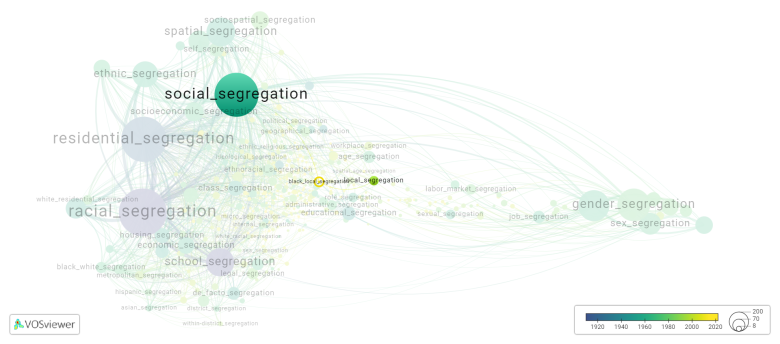Black local segregation: Difference between revisions
(Creating page) |
(Creating page) |
||
| Line 20: | Line 20: | ||
[[File:black_local_segregation.png|780x780px]] | [[File:black_local_segregation.png|780x780px]] | ||
This visualization is based on the study [[ | This visualization is based on the study [[Segregation_Wiki:About| The Multidisciplinary Landscape of Segregation Research]]. | ||
For the complete network of interrelated segregation forms, please refer to: | For the complete network of interrelated segregation forms, please refer to: | ||
Latest revision as of 07:17, 16 October 2024
Date and country of first publication[1][edit | edit source]
2022
United States
Definition[edit | edit source]
Black local segregation refers to the social, political, and economic separation of Black individuals or communities from other racial or ethnic groups within a specific locality, such as a neighborhood, city, or region. This form of segregation has historically been enforced through various discriminatory practices, such as redlining, restrictive housing covenants, and racial violence.
Black local segregation has its roots in the era of slavery and continued to persist even after the abolition of slavery. During the Jim Crow era, when racial discrimination was legally sanctioned, Black people were subjected to widespread segregation in public spaces, including schools, parks, restaurants, and public transportation. This segregation was enforced through laws known as "Jim Crow laws."
While the Civil Rights Movement in the 1950s and 1960s led to the dismantling of many legally sanctioned segregation practices, black local segregation persists to some extent today due to various socio-economic factors. In many cases, Black neighborhoods continue to face economic marginalization, lack of access to quality education and healthcare, and limited job opportunities, all of which contribute to their isolation from more affluent, predominantly white neighborhoods.
Black local segregation can have a profound impact on individuals and communities, leading to disparities in income, education, healthcare, and social capital. It promotes a pattern of racial and economic inequality, as it limits the opportunities and resources available to Black individuals and communities.
Efforts to address black local segregation have included fair housing laws, anti-discrimination policies, and initiatives aimed at promoting inclusive and diverse neighborhoods. However, more work is needed to dismantle the systemic barriers that perpetuate black local segregation and ensure equal opportunities for all individuals, regardless of race or ethnicity.
See also[edit | edit source]
Related segregation forms[edit | edit source]
Black local segregation is frequently discussed in the literature with the following segregation forms:
social segregation, local segregation

This visualization is based on the study The Multidisciplinary Landscape of Segregation Research.
For the complete network of interrelated segregation forms, please refer to:
References[edit | edit source]
Notes[edit | edit source]
- ↑ Date and country of first publication as informed by the Scopus database (December 2023).
At its current state, this definition has been generated by a Large Language Model (LLM) so far without review by an independent researcher or a member of the curating team of segregation experts that keep the Segregation Wiki online. While we strive for accuracy, we cannot guarantee its reliability, completeness and timeliness. Please use this content with caution and verify information as needed. Also, feel free to improve on the definition as you see fit, including the use of references and other informational resources. We value your input in enhancing the quality and accuracy of the definitions of segregation forms collectively offered in the Segregation Wiki ©.
Black local segregation appears in the following literature[edit | edit source]
Krivo L.J., Byron R.A., Calder C.A., Peterson R.D., Browning C.R., Kwan M.-P., Lee J.Y. (2015). Patterns of local segregation: Do they matter for neighborhood crime?. Social Science Research, 54(), 303-318. Academic Press Inc..https://doi.org/10.1016/j.ssresearch.2015.08.005
